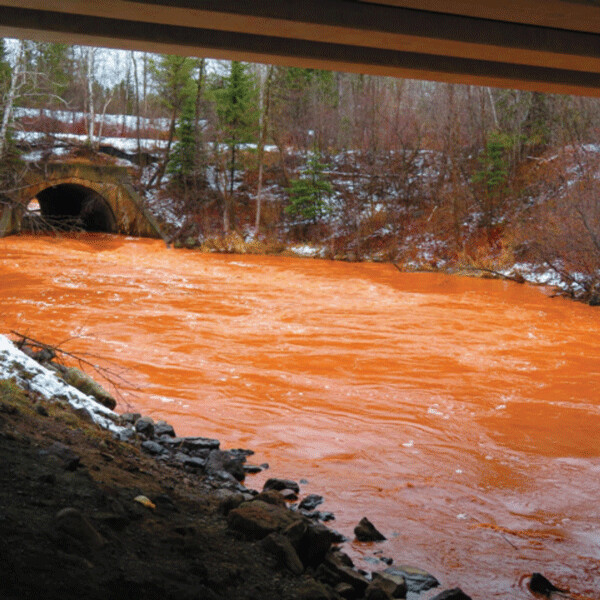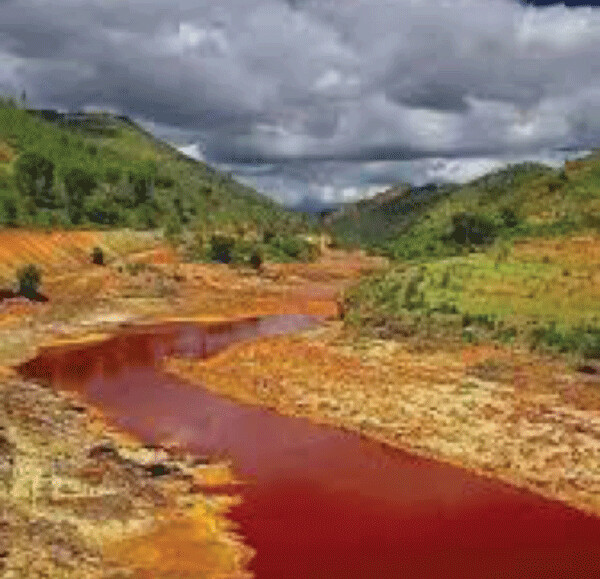News & Articles
Browse all content by date.

Minnesota’s Republican Party is hoping that good-hearted, environmentally-conscious Minnesotans who appreciate clean drinking and fishing water will subvert their ideals, ignore their better angels and vote for the Republican Party’s “red state” agenda next fall.
Supporters of America’s current “Polluter-in-Chief” Donald J. Trump, whose environmentally-destructive policies could literally turn the waters of northeastern Minnesota’s Partridge, Embarrass and upper St Louis Rivers into red, highly acidic, sulfuric acid-contaminated water that cannot support activities of normal life, (including fishing, boating, swimming or the growing of wild rice).
The Hector Mine Earthen Dam Rupture
Note that the break in the abandoned Hector mine pit near Biwabik on April 24, 2018 discharged massive amounts of toxic red-stained water into the Embarrass River, which then emptied into the Embarrass Lake, with uncertain, but probably devastating long-term consequences.
Interestingly, the only area journalist that reported on the catastrophe – with photos - was the Duluth Reader’s Richard Thomas. Read the article at (http://duluthreader.com/articles/2018/05/10/13298_closed_mine_comes_back_to_haunt_the_northland) The copper-mining-supporting Duluth News-Tribune chose to not report on the tailings pond break.
Lessons for Minnesota from the Environmentally Poisoned Red State of Southwestern Spain and its Highly Toxic Rio Tinto (“Red-Stained River”) Estuary
Throughout this column are photos of Spain’s Rio Tinto (“Red-Stained River”) that remains highly acidic (with a pH of less than 2.0 !!) and highly toxified with heavy metals even after thousands of years of off-and-on underground and open pit copper mining in Spain.
The many copper/heavy metal/sulfide mines in the area have discharged endless amounts of highly acidic (sulfuric acid), very dissolvable sulfide ore lining their wettened or water-immersed walls, and thus both forms of mines will unavoidably and continuously pollute the downstream water with acid-containing toxic minerals (including iron oxide, the cause of the red color) every time it rains or whenever the water table rises.


The Rio Tinto: Still Polluting After All These Years
Spain’s Rio Tinto River is characterized by its highly acidic red water (pH 1.7—2.5) that is highly contaminated with heavy metals. Over 5,000 years of mining pollution have contributed to the river and surrounding areas becoming a virtually uninhabitable environment.
The Rio Tinto holds a significant role in history as the birthplace of the Copper Age and Bronze Age. The first Rio Tinto mines were developed in 3000 BCE by ancient Iberians and Tartessans. Phoenicians were attracted by the area’s gold and silver deposits and worked the mines from 2800 - 2600 BCE.). The Romans mined the area from 2000 - 1800 BCE. Some of the empire’s first coins came from Rio Tinto’s silver and gold deposits. The Visigoths mined the area from1600 - 1300 BCE – followed by the Moors from 1300 - 500 BCE. The mines were rediscovered by Spain in 1556 – 1724 CE. In 1871 Spain sold the mining rights to the British multinational mining giant Rio Tinto and the area is still one of the most important sources of copper and sulfur in the world.
The following are quotes from a scholarly journal published by the University of South Florida:
“The Rio Tinto is known for its extreme environmental conditions of low pH and high concentrations of heavy metals. On average the pH of the water is around 2.0, but it varies with the season. Some areas measured as low as a pH 1.1, while other areas have recorded pH levels as high as 3. It has been observed that the pH tends to be lower in beginning of the river and higher as the river nears the mouth. There are three primary heavy metals found in the water column, they are iron, copper, and zinc.”
“The Rio Tinto system in southwestern Spain…. is one of the most polluted fluvial-estuarine systems in the world and most likely has been so for thousands of years.”
”The city of Huelva, Spain, has become the site of one of the most polluted industrial areas of the world.”
“Spain’s Rio Tinto is characterized by deep red water that is highly acidic (pH 1.7—2.5) and rich in toxic heavy metals”
“The contaminants that have cursed every area where copper sulfide mining has been tried, include the highly toxic heavy metals Lead, Mercury, Arsenic, Nickel, Zinc, Cadmium, Vanadium Antimony and Manganese”.
The undrinkable, permanently poisoned water in the Rio Tinto watershed extends all the way down to the edge of the now-polluted salt-water of the Atlantic Ocean estuary downstream. That once-thriving fishery has long-since been decimated because of the continuous flow of toxic water over the centuries – thanks to sulfide mining. The Rio Tinto, from its source all the way down to its mouth, has the acidity of stomach acid (< pH 2.5), as does the water that is gradually filling the abandoned open pit sulfide mine also pictured above. The abandoned underground copper mines also contain highly poisonous water, thanks to sulfide mining.
Holden Village and the Copper Sulfide Mine that Devastated the Once-thriving Lake Chelan Fishery
Holden Village is a Lutheran Church family retreat center near the headwaters of Lake Chelan, Washington. My wife and I have spent a number of week-long retreats there over the years. I recall being intrigued by massive pile of gold colored, finely-ground copper mine tailings that blew around in the wind. The powdery mine waste had been deposited on the opposite side of the highly toxic and very fishless creek and we villagers were warned to avoid the water, since the wast material entered the creek every time it rained.
I was also intrigued by Lake Chelan’s unearthly iridescent color of the mouth of that creek and of the shallow water where the boat dropped us off at the dock upon arrival. Now I understand where the strange colors came from and why it was so naïve of me to have considered bringing fishing gear with me at our next visit.
Holden Village was started from scratch in 1938 as a remote company town (no roads; the only access to the outside world was by boat) that housed miners and their families. The villagers lived a short walking distances from the underground copper mine that was built by the Howe Sound Mining Company of Canada. After 19 years of mining Howe suddenly abandoned the mine and the village, turned off the water pumps (that kept the mine dry enough to mine), fired its hundreds of miners, leaving behind a ghost town, a permanently-poisoned underground copper mine, a huge toxic dry tailings dump (that was situated immediately adjacent to the (ex-)trout stream that then flowed into the contaminated Lake Chelan which had, of course, received unknown millions of gallons of poisoned water ever since 1938.
World copper prices plummeted in 1957 and Howe Sound immediately closed the mine, giving no advance warning to its employees. Holden Village was destined to become another classical ghost mine town, except for the fact that the company gifted the town to several Lutheran church denominations in 1960 (after failing to sell it for an asking price of $100,000). The Lutheran church soon established a family retreat center that is thriving to this day, except for the trout, for they cannot survive in the still-poisoned Railroad Creek that receives the endlessly contaminating water that overflows from the mine shaft mouth.
Interestingly, because of a series of mergers and acquisitions, the infamous Rio Tinto Mining Company acquired the responsibility of remediating Holden Village’s dry tailings dump, which had been designated a SuperFund site by the Environmental Protection Agency.
Rio Tinto workers have spent the past few years at Holden Village attempting to remediate the Holden Village site by constructing a walled structure that is supposed to stop toxic drainage from the tailings every time it rains and to hopefully keep an earthquake from de-stabilizing the mound of toxic wastes that could suddenly empty into Lake Chelan. The underground mine is off-limits to curious explorers only because the water has a variety of toxic heavy metals dissolved in it and because the pH of the water at the mine mouth is <2.5 and will remain so for eternity.
Reckless Endangerment of Northern Minnesota’s Water-Rich Environment – for the Love of a Lousy Buck
Highly acidic water is incompatible with > 99% of aquatic life and cannot be economically converted back into drinking water, even with high-tech (and unaffordable) reverse osmosis techniques that have been deceptively suggested by PolyMet salespersons as a possible remediation technique for the perhaps billions of gallons of poisoned water that it will inevitably produce over the decades.
But there is something even worse than the sulfuric acid-contaminated water is the presence of highly toxic heavy metals that are in both the sulfide sludge in the tailings ponds, the water in the aquifers below the ponds and pits and in the water (even rain water) that was in contact with the sludge. And that reality is the presence of the neurotoxic and carcinogenic heavy metals that are, when they reach sufficient concentrations or combinations, also incompatible with life and health.
Northern Minnesota’s rivers and lakes that are in the vicinity or are downstream from PolyMet’s proposed tailings lagoon are being recklessly endangered by campaign money-hungry politicians and their wealthy corporate paymasters. PolyMet’s soluble earthen dam will eventually reach a highly unstable 250 feet tall and “contain” uncountable millions of cubic meters of toxic sludge forever.
PolyMet’s state-of-the-art “containment” (theoretically-speaking) dam that will supposedly hold back the massive volumes of liquified toxic sludge for an eternity will be similar to the state-of-the-art dam that burst open after heavy rains at British Colombia’s Mount Polley tailings “pond”. That massive lagoon had been “contained” by 130 feet high earthen dam walls that dissolved on August 4, 2014 and permanently poisoned downstream streams, lakes and rivers.
Copper Mining Catastrophes Can Happen Here In Minnesota, Particularly if it Turns Into a “Red State”
Such mining catastrophes can happen here, and the Partridge River, the Embarrass River, the St Louis River and Lake Superior are being recklessly endangered by politicians who are unable to learn or simply don’t want to understand what is known about environmental science.
Years ago Minnesotan and Iron Ranger Bob Dylan wrote a powerful song that expressed many of the hopes, fears and feelings being experienced right now by the many worthy, well-informed, under-funded, disillusioned and altruistic environmentalists who are fighting against powerful sociopathic, uber-wealthy, exploitive foreign corporations and their political, bureaucratic, Big Government, Big Business and Big Media allies who ignore the high risk of engaging in copper-sulfide mining in a water-rich environment like northeast Minnesota.
Dylan writes:
“I can see through your walls and I know you’re hurting;
Sorrow covers you up just like a cape;
Only yesterday I know that you’ve been flirting
With disaster you somehow managed to escape.”
“I saw thousands who could have overcome the darkness
But for the love of a lousy buck, I’ve watched them die.”
The extent of cross- party support for what is ethically, morally and scientifically unsupportable is breath-taking. Scientifically-illiterate politicians of both major parties seem are beholden to Big Money interests that have generous campaign “donations” to make. Candidates for Congress, candidates for mayor and city council all seem to need more money for their campaigns. DNR bureaucrats, PCA bureaucrats, US Forest Service bureaucrats, newspaper editors and writers of every major party allegiance seem to think that they need the blessings of corporate leaders. Even classically pro-environment DFLers such as Senators Amy Klobuchar and Tina Smith, recently retired US House member Rick Nolan, Governor Mark Dayton, most Iron Range politicians such as DFLers David Tomassoni, Tom Rukavina and Tom Bakk are taking the side of the foreign mining companies, justifying their positions because of a relatively few temporary jobs while risking being tarred and feathered and driven out of town on a rail if and when the tailings dams fail. And, as is to be expected, most of the guilty politicians are lining up at the feeding trough to get their share of corporate campaign bribes.
The explanation about the real dangers of copper/sulfide mining should compel every scientifically-literate, good-hearted, caring person to reject, protest against and otherwise obstruct the reckless endangerment of Minnesota’s environmental future by the above-noted political entities that are, so far, being successfully bamboozled by the un-documented foreigners like PolyMet, Glencore, Twin Metals, Antofagasta and the many other corporations waiting in the wings to exploit Minnesota’s resources.
Turning Minnesota into a “Red State” – in either iteration of the phrase - would be a big mistake for the long-term future of Minnesota’s children and other living things.
| Tweet |


